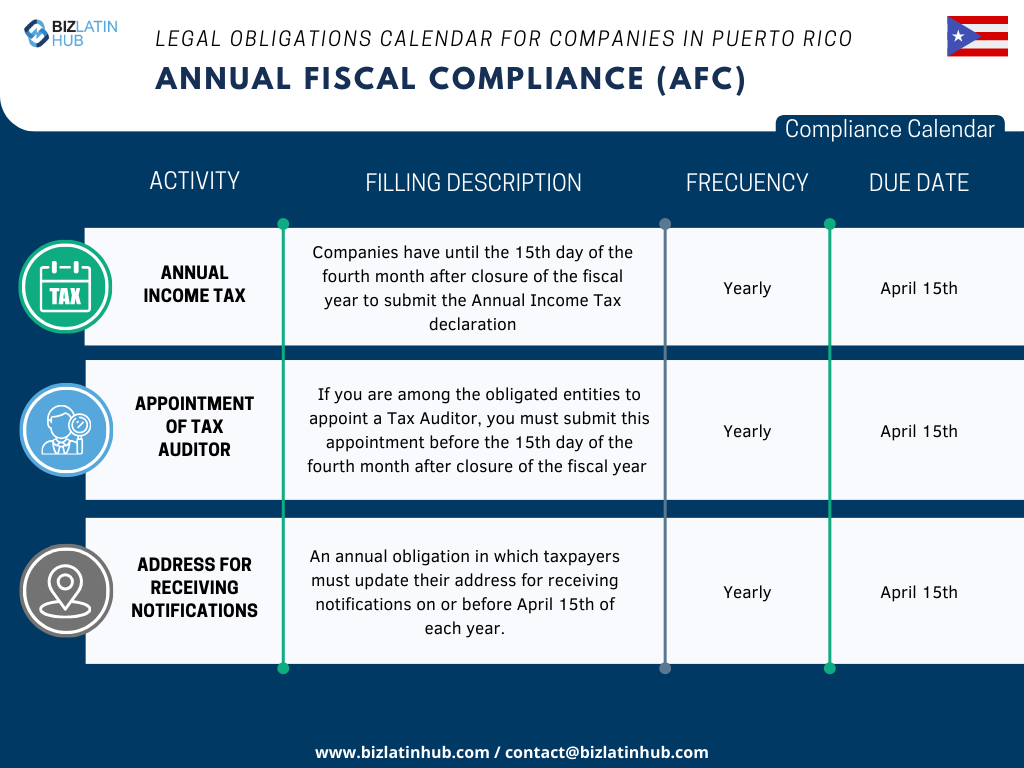Are you sure your business meets all the requirements in Puerto Rico? Many companies unknowingly operate outside regulatory boundaries, risking serious penalties. Understanding compliance can save both time and resources.
Puerto Rico has specific regulations that vary from local to federal levels. Businesses must be aware of their obligations, including licensing, permitting, and reporting practices. Knowing these requirements is the first step in protecting your company’s future.
This article explores key compliance areas in Puerto Rico and highlights strategies for ensuring adherence to regulatory agencies. By staying informed and proactive, businesses can avoid fines and safeguard their reputation.
Key Compliance Areas in Puerto Rico
Businesses in Puerto Rico must follow strict compliance rules. Companies must report beneficial ownership information to FinCEN unless exempt. An S-Corporation in Puerto Rico must also meet these rules unless it qualifies for exemptions.
To stay compliant, businesses should monitor for any citations or violations. Regular checks can prevent issues with regulatory agencies. Companies should interpret results from government searches carefully to avoid potential compliance problems. Filing for an employer ID, fictitious business name, or professional license does not make a business a reporting company automatically.
Business Entity Status and Unique Entity ID
Registering a business on SAM.gov begins with a status of “Work in Progress.” This status lets users save and update information for up to 90 days. Entity validation ensures that each business name and address is unique.
The Unique Entity ID is a 12-character code for every entity in SAM.gov. An Entity Validation Service verifies this uniqueness. Each section of SAM.gov’s registration status indicates progress in real-time for users working on registration.
State Filing Requirements
Most states require businesses to submit an annual report or a biennial statement. This is essential to remain compliant with state laws. Due dates vary by state; some are based on the business formation date, while others have a set date for all businesses.
Filing these reports often involves fees, sometimes over $300. Legal compliance is crucial for continued operation. Working with legal teams helps ensure all filing requirements are met. Businesses must implement systems that support state filing compliance.
Federal Filing Obligations
Domestic entities like statutory trusts become reporting companies upon filing specific documents. This often involves state offices. Foreign entities must also file documents to conduct business in the United States when required.
Some entities, such as certain trusts, may be exempt from filing requirements depending on jurisdiction laws. Understanding any possible exemptions is vital. These may apply to tax-exempt entities like foundations. Compliance may involve filing paperwork or paying taxes to meet legal requirements.
Licensing and Permitting Requirements
Licenses and permits are vital for businesses to operate legally. The type needed may vary by industry and location. For example, a restaurant must renew health and safety certificates regularly. A business selling items like alcohol, tobacco, or tires needs sales permits. Professionals, such as plumbers or nurses, must obtain certification from a third-party board to keep their licenses. Businesses should check with federal agencies for renewal details of licenses or permits.
Types of Licenses Needed for Different Industries
Different industries need specific licenses. To comply with regulations, companies must appoint a registered agent. This agent helps with annual reports and other filings. Businesses must maintain licenses for legal operation. For example, a financial adviser needs specific certification. Understanding state requirements for forming and registering a company is crucial. This ensures that businesses meet compliance standards.
Importance of Permits in Operational Legality
Permits help businesses stay legally compliant. The required documents differ by industry and location. A food service company must renew health and safety documents regularly. Companies selling items like tobacco need frequent sales permit renewal. Professionals, such as nurses, need ongoing certification. Organizations should check local business offices for renewal details. This helps maintain operational legality.
| Industry | License/Permit Required |
|---|---|
| Restaurant | Health and Safety Certificate |
| Retail (Alcohol) | Sales Permit for Alcohol |
| Nursing | Certification from a Third-party Board |
| Financial Services | Certification and Annual Reports |
In summary, staying informed about licensing and permitting needs is crucial for maintaining a business’s legal standing. Make sure to consult the appropriate regulatory bodies to keep all permits and licenses up to date.
Understanding Consumer Reports and the Fair Credit Reporting Act (FCRA)
Consumer reports gather personal data. This includes credit scores and criminal backgrounds. Employers often use these for hiring. The Fair Credit Reporting Act (FCRA) sets rules for this use. Before using a report, employers must notify the individual. This notice must be clear and separate from other materials.
Employer Responsibilities Under FCRA
Employers must give written notice before using a consumer report. This notice cannot be part of the job application. The FCRA ensures these steps are followed for hiring or promotion decisions. If a negative decision is made based on a report, the employer must inform the person. The Federal Trade Commission (FTC) oversees these rules.
Pre-Employment Background Checks: Best Practices
Background checks help businesses hire smartly. Checking criminal and financial records is part of this process. Before starting, get the applicant’s permission. Information needed includes the full name, date of birth, and Social Security Number. Ensure checks cover the past seven years of addresses. Also, verify immigration status and education history.
| Key Information Needed | Details |
|---|---|
| Full Name | Applicant’s complete legal name |
| Date of Birth | Verify identity with birth date |
| Government ID or SSN | Social Security Number or other ID |
| Past Addresses | Residential history over seven years |
Background checks should be thorough. This approach leads to more informed decisions and saves time and resources.
Legal departments play an essential role in ensuring compliance. They must implement effective compliance policies and educate employees about these rules. Organizations need to stay informed about relevant regulations. They operate across different jurisdictions, so changes can impact them. A comprehensive legal compliance program should include seven key elements. These are standards, policies, procedures, monitoring, and internal reporting systems.
Compliance professionals develop procedures to ensure operations stay within legal limits. In-house counsel contributes by providing training and conducting due diligence. They also offer legal guidance and analysis. Compliance is crucial for maintaining smooth business operations.
Overview of Inspection Classification Databases
The Inspection Classification Database provides information on specific inspections. However, it does not cover all types. State-conducted and pre-approval inspections are not included. The database has three types of classifications: No Action Indicated (NAI), Voluntary Action Indicated (VAI), and Official Action Indicated (OAI).
Data comes from FDA compliance and enforcement resources. Note that this database excludes nonclinical laboratory inspections and those waiting for final enforcement actions. Use this data wisely, understanding its limitations.
Tax Compliance Reporting: IRS Requirements
The Foreign Account Tax Compliance Act (FATCA) requires certain U.S. taxpayers to report foreign assets to the IRS. Corporations must file Form 8806 if there’s a change in control or capital structure. The IRS uses these reports to monitor compliance.

The Industry Issue Resolution (IIR) Program addresses common tax disputes, inviting suggestions from taxpayers and representatives. The FASB Interpretation No. 48 covers accounting for uncertain tax positions. It sets rules for recognition and disclosure following U.S. GAAP.
Taxpayers wanting to change their filing status from a C Corporation to an S Corporation should follow IRS guidelines. These guidelines detail specific filing requirements. Understanding these elements is key to maintaining compliance with tax obligations.
Role of Technology in Ensuring Compliance
Technology helps companies meet legal requirements. It provides fast access to real-time data. This data is vital for staying compliant with regulations. Technology tools allow companies to manage their compliance duties efficiently. They help set up strong compliance programs by monitoring third parties continuously.
Using outdated data can harm compliance efforts. Technology prevents this by supplying accurate information. Compliance tools let companies assess and watch third parties closely. This reduces risks from unverified external partners.
Compliance Management Software Solutions
Compliance management software supports businesses in handling regulatory duties. It helps in forming reliable compliance programs. Top solutions assess and monitor third-party compliance constantly. This ensures adherence to regulatory standards.
These tools offer centralized control of policy and training. All staff receive the necessary information for compliance. The software provides quick access to current data. This access is key to maintaining compliance status accurately.
Digital Tools for Tracking Licenses and Filings
Digital tools are crucial for legal compliance. They offer quick access to updated, real-time data. Such data is essential to meet compliance needs and avoid potential issues. Compliance software manages regulatory duties. It keeps organizations informed about regulations and deadlines.
Effective solutions help in assessing and monitoring third-party dealings. They support the overall compliance strategy. Centralized management of policies and training makes compliance efforts more efficient. This ensures everyone knows their regulatory responsibilities.
Let’s look at key features of compliance technology:
| Feature | Description |
|---|---|
| Real-time Data Access | Provides current information for compliance |
| Centralized Management | Combines policy and training in one system |
| Third-party Monitoring | Checks and screens external partners |
| Quick Issue Resolution | Identifies and fixes non-compliance promptly |
Robust systems greatly reduce financial and image risks. Accurate data helps avoid problems from non-compliance.
Proactive Compliance Strategies
Proactive compliance strategies help businesses avoid legal problems. Keeping clear records is crucial. A good compliance process includes checks and policies that support following regulations. Regular attention to compliance programs helps prevent issues like fines or damage to reputation. Compliance needs can vary by location, making the task demanding. Tools like policy management solutions are useful. Cooperation between compliance and legal teams ensures strong compliance management.
Regular Compliance Audits
Regular audits are vital for checking legal compliance. They help monitor company processes and third-party interactions. Clear policies need to be communicated to every employee. Staff should know their roles and join training programs. Real-time data is key for maintaining accurate compliance. Outdated info can lead to serious penalties. Regular audits help a company stay current with new rules or deadlines. Automated filings should be verified often to prevent late submissions.
Employee Training and Awareness Programs
Employee training is crucial for understanding compliance policies. Organizations must include education strategies for compliance issues. This includes creating a culture focused on compliance. A thorough compliance program involves regular audits to check the effectiveness of training. Internal systems should encourage employees to report any issues. This boosts awareness and responsibility across the organization.
| Compliance Strategy | Benefit |
|---|---|
| Regular Audits | Prevents legal issues and monitors processes |
| Employee Training | Ensures staff knows policies and creates compliance culture |
| Communication | Clear responsibilities and encourages reporting issues |
Simple steps and clear communication aid in maintaining compliance. Regular checks and staff training are key elements. By focusing on these areas, companies can establish a strong compliance framework.
Consequences of Non-Compliance
Non-compliance with regulations can have serious effects on companies. Legal issues, fines, and reputational damage are common consequences. Severe non-compliance may lead to criminal charges against company directors. Regulatory agencies often scrutinize companies that neglect compliance, exposing them to potential sanctions. Effective compliance programs help minimize these risks and maintain smooth business operations.
Legal Penalties and Fines
Ignoring legal compliance can lead to severe penalties. Companies face fines from federal agencies or regulatory bodies when they fail to comply. Legal violations can also damage a company’s reputation, affecting customer trust. In extreme cases, company directors might face jail time. To avoid these outcomes, businesses must adhere to regulations consistently. Implementing a solid compliance program shows regulators that the company respects legal requirements.
Impact on Business Reputation
A company’s reputation can suffer greatly from non-compliance. Monitoring third-party compliance is crucial. Failure to do so can result in financial and reputational harm. Using outdated data increases the risk of compliance errors. This can negatively impact how the public views the company. Compliance software helps manage regulatory duties and enhances a company’s credibility. Monitoring criminal and driving records alerts businesses to risks posed by employees or contractors. Prompt action can prevent reputational harm and financial liabilities.
Staying Informed and Adaptable in Compliance Efforts
Staying informed and adaptable in compliance efforts requires clear communication and training. Employees must understand their roles, from the board level down. Organize training programs to promote compliance awareness. Highlight its importance for maintaining standards.
Regular checks are crucial. They assess not just internal processes, but also third-party compliance. Use real-time data to support a strong legal framework. Outdated data can harm compliance and lead to financial and reputational issues.
Compliance evaluation involves checking adherence to both external and internal controls. External regulations come from government and industry bodies. Internal systems are designed to meet those standards.
Key Compliance Steps:
- Communicate responsibilities clearly.
- Organize training and education programs.
- Conduct regular compliance checks.
- Use real-time data.
- Evaluate external and internal adherence.
These steps help maintain a compliant business environment and reduce risks effectively.



